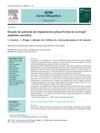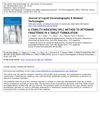 66 citations,
August 1999 in “The Journal of Clinical Endocrinology & Metabolism”
66 citations,
August 1999 in “The Journal of Clinical Endocrinology & Metabolism” Women with acromegaly often have irregular periods due to hormone imbalances and growth hormone effects.
 April 2018 in “Journal of Ayurvedic and herbal medicine”
April 2018 in “Journal of Ayurvedic and herbal medicine” Computational methods can speed up and improve the development and safety of herbal drugs.
 126 citations,
January 2001 in “World Journal of Surgery”
126 citations,
January 2001 in “World Journal of Surgery” Surgery is the main treatment for liver hydatidosis, but has risks; albendazole is the most effective drug but can have side effects.
7 citations,
January 1995 Silicone pretreatment protects hair from damage and reduces color fading without interfering with bleaching or dyeing.
4 citations,
June 2017 in “Annales de dermatologie et de vénéréologie” The study found that a specific type of hair loss is increasingly common in premenopausal women and can be effectively diagnosed and treated with various medications.
January 2016 in “ISBN: 978-84-608-9184-0” 1 citations,
July 2021 in “Small ruminant research” Vitamin E, alone or with yeast, helped reduce arsenic poisoning effects in young goats.
 November 2022 in “The journal of investigative dermatology/Journal of investigative dermatology”
November 2022 in “The journal of investigative dermatology/Journal of investigative dermatology” Researchers made a detailed map of gene activity for different parts of human hair follicles to help create targeted hair disorder treatments.
3 citations,
June 2017 in “Reproductive biomedicine online” A certain mutation in the fetal alpha 5-reductase gene is linked to a higher risk of late miscarriage.
 3 citations,
January 2020 in “Acta Dermato Venereologica”
3 citations,
January 2020 in “Acta Dermato Venereologica” Netherton Syndrome can cause severe skin lesions in rare cases.
April 2023 in “Journal of Investigative Dermatology” CD8+ T cells attack hair follicle stem cells, causing scarring and hair loss.
 September 2001 in “PubMed”
September 2001 in “PubMed” The new X-ray technique allows for precise and non-destructive measurement of elements in hair, creating the first database of its kind for a specific ethnic group.
157 citations,
April 1997 in “International journal of legal medicine” Cosmetic hair treatments like bleaching and dyeing reduce drug levels in hair samples.
 April 2023 in “The journal of investigative dermatology/Journal of investigative dermatology”
April 2023 in “The journal of investigative dermatology/Journal of investigative dermatology” Tet2 and Tet3 enzymes are important for controlling hair growth and shape by affecting gene activity and DNA structure in hair follicles.
 27 citations,
June 2013 in “Genes & development”
27 citations,
June 2013 in “Genes & development” Cav1.2 affects hair growth and could be a target for hair loss treatments.
20 citations,
November 2014 in “JAMA dermatology” The 810-nm diode laser improves skin texture in keratosis pilaris but not redness.
October 2020 in “M/C Journal” Society's view of "freaks" has shifted from natural deformities to extreme plastic surgery, reflecting changing beauty standards and pressures.
 10 citations,
May 2013 in “Actas Dermo-Sifiliográficas”
10 citations,
May 2013 in “Actas Dermo-Sifiliográficas” Most white Spanish women have a widow's peak, and their hairline measurements could help in hair restoration surgery.
6 citations,
February 1997 in “International Journal of Dermatology” Kaposi's sarcoma lesions might originate from benign tissue changes.
152 citations,
April 2002 in “The journal of investigative dermatology/Journal of investigative dermatology” A new mutation in the Connexin 26 gene was found in a patient with KID syndrome, expanding the known disorders linked to this gene.
5 citations,
July 1987 in “European Journal of Obstetrics & Gynecology and Reproductive Biology” The treatment temporarily improved symptoms of hyperandrogenism in adolescents.
 2 citations,
August 2002 in “BJUI”
2 citations,
August 2002 in “BJUI” Finasteride can cause low platelet count in rare cases.
 August 2002 in “Zeitschrift für Hautkrankheiten”
August 2002 in “Zeitschrift für Hautkrankheiten” Female pattern hair loss affects crown, increases with age, and has limited treatments.
88 citations,
August 1998 in “Carcinogenesis” High levels of ODC and a mutant Ha-ras gene cause tumors in mice.

More minoxidil applied topically leads to better hair growth in male pattern baldness.
 27 citations,
December 2013 in “Endocrinology”
27 citations,
December 2013 in “Endocrinology” Researchers created a mouse model for Cushing's syndrome to study glucocorticoid excess and potential treatments.
 45 citations,
October 2008 in “Cytokine & Growth Factor Reviews”
45 citations,
October 2008 in “Cytokine & Growth Factor Reviews” Activins and follistatins, part of the TGFβ family, are crucial for hair follicle development and skin health, affecting growth, repair, and the hair cycle.
 202 citations,
August 2007 in “Biomaterials”
202 citations,
August 2007 in “Biomaterials” Artificial skin development has challenges, but new materials and understanding cell behavior could improve tissue repair. Also, certain growth factors and hydrogel technology show promise for advanced skin replacement therapies.
 19 citations,
December 2002 in “Journal of Liquid Chromatography & Related Technologies”
19 citations,
December 2002 in “Journal of Liquid Chromatography & Related Technologies” New method quickly and accurately measures finasteride in tablets.
162 citations,
October 2014 in “Autoimmunity reviews” Alopecia areata is caused by the immune system attacking hair follicles.
















